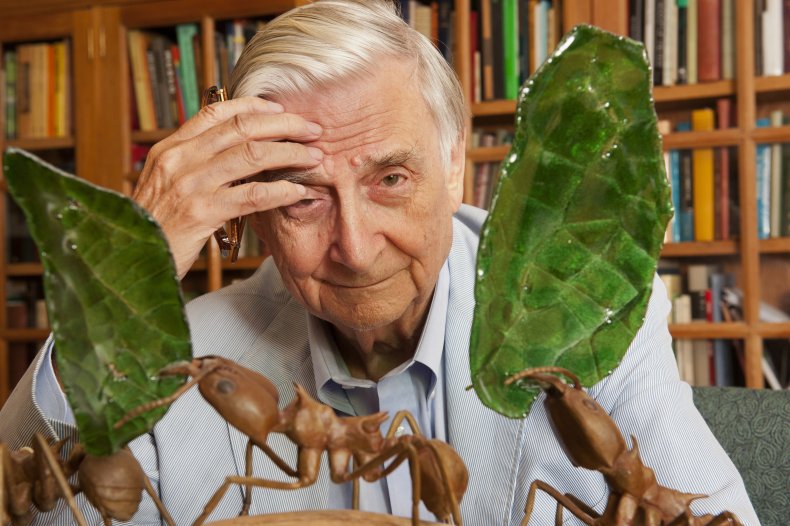Edward O. Wilson, a biologist celebrated for creating the field of sociobiology and a leading authority on ants, died December 26 at age 92.
The influential naturalist "was called 'Darwin's natural heir,' and was known affectionately as 'the ant man' for his pioneering work as an entomologist," the E.O. Wilson Biodiversity Foundation wrote in a statement.
A longtime Harvard professor, Wilson won Pulitzer Prizes for the nonfiction works On Human Nature in 1979 and The Ants in 1991. Among his many other accolades are a National Medal of Science and a Crafoord Prize.
Wilson was also dubbed "the father of biodiversity," and was a fervent advocate for protecting the environment. A prolific writer, he published more than 30 books, including a bestselling work of fiction, 2010's Anthill: A Novel.

Many colleagues and admirers paid tribute to Wilson on social media, including former Vice President Al Gore, who also noted the December 25 passing of prominent ecologist Thomas Lovejoy.
"It is heartbreaking to lose Tom Lovejoy & EO Wilson, two towering figures in conservation," Gore wrote on Monday. "Both were passionate defenders of life on Earth who worked with kindness and compassion to advance our understanding of the world around us. I was lucky to know them and call them friends."
It is heartbreaking to lose Tom Lovejoy & EO Wilson, two towering figures in conservation. Both were passionate defenders of life on Earth who worked with kindness and compassion to advance our understanding of the world around us. I was lucky to know them and call them friends.
— Al Gore (@algore) December 27, 2021
Wilson first gained prominence within the scientific community with the 1967 publication of The Theory of Island Biogeography. Co-authored by Robert MacArthur, the book's study drew a link between an island's size and the number of species it contained.
He enjoyed another celebrated collaboration with Harvard mathematician William Bossery, and the two extensively studied the secretion of pheromones as a tool of communication among ants. Their work pioneered the study of how not just animals but also plants and microorganisms use scents.
In the 1970s, Wilson created the field of sociobiology, which argued that genetic traits play a role in human and animal behavior, thus rejecting the formerly accepted belief that mental behavior in youth is formed by nurture. These theories were explored in his books The Insect Societies (1971) and Sociobiology: The New Synthesis (1975).
During his later years, Wilson argued for a conservation concept he laid out in his 2016 book, Half-Earth. In that work, he called for the setting aside of half of Earth's lands and seas for other species. Wilson set up the Half-Earth Project to continue this goal.
"E.O. Wilson's holy grail was the sheer delight of the pursuit of knowledge. A relentless synthesizer of ideas, his courageous scientific focus and poetic voice transformed our way of understanding ourselves and our planet," Paula J. Ehrlich, CEO & President of the E.O. Wilson Biodiversity Foundation, said in a statement.
Ehrlich continued, "His greatest hope was that students everywhere share his passion for discovery as the ultimate scientific foundation for future stewardship of our planet. His gift was a deep belief in people and our shared human resolve to save the natural world."

Post a Comment